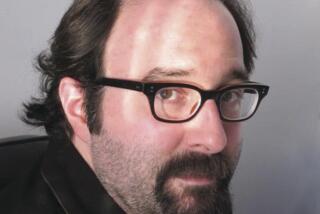SCREEN GIVES REALITY TO HUMANITYâS NUCLEAR NIGHTMARES : It Was Almost Impossible for Anyone of a Certain Age Not to Flash on Images From âOn the Beachâ and âChina Syndromeâ When Reports of the Soviet Tragedy Became Known : THE PROPHETIC CONTENT OF END-OF-THE-WORLD MOVIES
There are psychologists, specializing in the subject, who worry that we all live on borrowed dreams. Instead of letting our own subconsciousnesses wander free under the cover of night, we summon up a collage of old movies and old television shows. We may make ourselves the stars, or participants at least, but--the psychologists say--we are still hitchhiking on someone elseâs imagination.
I canât be sure if this is true or false; my own dreams seem to be home-grown. But what is indubitably true is that our waking nightmares are informed by movies and television.
The you-are-there power and immediacy of the visual experience give us, safely but irrevocably, the predator in the dark hallway, the last seconds before the shattering plane crash (âSweet Dreamsâ), the coiled and striking snake. . . . and the poisoned, radioactive cloud, moving inexorably toward us like death in slow motion.
It was almost impossible for anyone of a certain age not to flash on images from âOn the Beachâ and âThe China Syndromeâ when the first vague reports out of Sweden of unusual radiation in the air became the imperfectly detailed reality of the Soviet tragedy at Chernobyl.
âOn the Beach,â Stanley Kramerâs 1959 drama, from the Nevil Shute novel, now seems prophetic by a quarter-century or more, and Fred Astaire in a dramatic role, revving up for surcease at the wheel of his beloved sports car, was then and now a chilling image of the ultimate fatalism.
As âThe China Syndromeâ was uncannily prophetic of Three Mile Island, where the accident took place even as the film was ready for release, so it prophesied Chernobyl as well.
The adjoining stories remind us how often the movies and television have frequently dealt with the nuclear issue. Most often the subject has been atomic war and its consequences. But, in âThe China Syndrome,â the horrors were the perils of peacetime technological accidents born of human incompetence and failure.
(The headline for both Three Mile Island and Chernobyl should have been âTechnology Lays an Egg.â)
A friend, preparing to leave this week for the Cannes Film Festival, said, âThe terrorists donât scare me, but that radioactive cloud terrifies me.â Indeed, the new fear is not that the world will end with a bang but that we might succumb to the invisibly, untasteably poisoned and silent air.
The nightmares, even beyond the present bulletins of growing radiation sickness, are easy enough to imagine and convey. Yet you have to hope that out of Chernobyl some further and thoughtful dramas will emerge.
Chernobyl, like Three Mile Island before it, dramatizes the case against nuclear warfare with a force and urgency that all the propaganda and rhetoric in the world could not equal.
It may be that technology can get its act together and make the production of peaceful nuclear energy safe (although its present losing streak does not invite confidence).
But the meltdown in the Ukraine puts beyond doubt or argument what an unthinkable catastrophe the use of nuclear weapons would be. The shred of consolation out of the present disaster is that it is a lesson learned relatively cheaply.
An auxiliary lesson, and the stuff of future drama, is that the people have behaved better than their governments. The humanitarian willingness to lend a hand has cut across the defensive silences of a closed society and the accusing political capitalizing of an open society.
The message of the nuclear accidents, fictional and real, is that ecologically the world is one; thereâs no such thing as limited nuclear war, no longer any place for anyone to hide.
The political leaders of every persuasion have to measure their philosophical differences, profound as they are, against their shared and fateful perils, and do it while time remains. The sound track, as before, carries a steady, insistent pulsing, as of a heartbeat or a clock, getting louder.
More to Read
Only good movies
Get the Indie Focus newsletter, Mark Olsen's weekly guide to the world of cinema.
You may occasionally receive promotional content from the Los Angeles Times.










